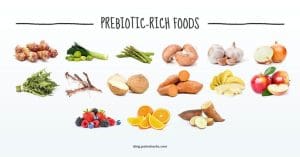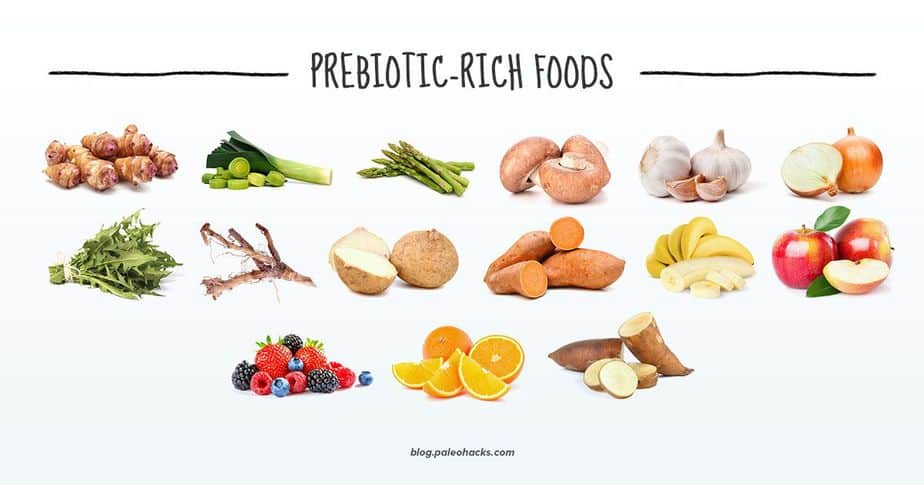
It’s no wonder our gut is called the second brain. Nearly 80% of our immune system is located in the digestive tract, and probiotics help keep our body in good shape. Your gut creates 95% of the serotonin that aids brain function and mood fluctuations, too.
Probiotics are good bacteria, essential for our GI tract, that help absorb nutrients and defend against infections. A 2012 NIH study found nearly 4 million Americans were consuming probiotics and prebiotics. That’s a fourfold increase since 2007.
We’ve all heard about the benefits of probiotics. But what about prebiotics, their lesser-known cousin? What are prebiotics?
Health benefits of prebiotics
Prebiotics are non-digestible compound fibers that nourish the good bacteria in your GI for overall wellbeing. This is where microbiome therapy comes into play. The consumption of prebiotics feeds probiotic bacteria, allowing them to do their job more effectively and keeping your gut running smoothly.
Although probiotics can function on their own, the ingestion of prebiotics allows them to work more efficiently—and that delivers a host of health benefits.
Digestion: Harmful toxins in the digestive tract can cause a number of health problems. Prebiotics indirectly help keep a healthy balance. As food for probiotics, they construct short-chain fatty acids like butyric acid to enhance the intestinal lining. These fatty acids modulate electrolyte levels, causing the body to steer clear of indigestion, diarrhea and irritable bowel conditions.
Cardiovascular Health: A high-fiber diet provides a lot of prebiotics, reducing inflammation and thus keeping you safe from cardiovascular complications. Type 2 diabetes and obesity are linked to the consumption of prebiotics and probiotics due to their role in metabolizing nutrients. This means fats are stored more effectively and don’t clog your arteries.
If your salad contains dandelion greens, then you’re getting 4 grams of fiber for every 100gms. These greens have anti-inflammatory effects and lower your cholesterol, as well. Besides its anti-microbial effects, garlic also reduces the risk of heart disease and cancer.
Better Immunity: Prebiotics reduce gut pH, helping you avert the magnification of deadly pathogens and bacteria. Trace minerals and nutrients are more effectively absorbed by our body when there is a surge in prebiotic and probiotic intake, thus boosting the immune system.
When the gut microbiota is balanced through prebiotics, the immune system can function more effectively. Onions and leeks are known to strengthen gut flora and break down fat, both essential actions that boost the immune system.
A weak immune system opens you up to a slew of health complications. Your prebiotic intake, on the other hand, helps shield you from the common cold and even more serious conditions like urinary tract infections and cognitive impairment.
Hormonal Balance: It may sound strange, but your mood swings are most likely linked to gut health. The food you eat and the manner in which your body absorbs nutrients eventually impacts the creation of hormones, like serotonin, that lifts your mood and kills stress.
Cortisol brings with it a wave of problems like high blood pressure, cognitive interference and weight gain—and that’s just for starters. A recent study showed that prebiotics lower cortisol levels.
Unfortunately, the extensive health benefits of prebiotics and probiotics don’t always get realized through supplements alone. These products contain specific strains of bacteria, some of which may do nothing once consumed. To ensure the best results, read through reviews and consult with your doctor on the best type of prebiotic and probiotic supplements for your needs.
Foods that provide natural prebiotics
Supplements can do wonders, as long as you choose the best ones. But prebiotic foods also play a large role in keeping your gut working the way it’s supposed to. Here are a few healthy, prebiotic-rich foods to add to your diet.
Bananas: The resistant starch in green bananas has prebiotic effects. Besides being rich in minerals and vitamins, prebiotic fiber in the fruit diminishes bloating and helps gut bacteria thrive.
Barley: The beta-glucan fiber (3% to 8% per 100gms) found in barley lowers cholesterol, and its selenium content has major antioxidant advantages.
Flaxseed: The flaxseed’s insoluble lignin and cellulose fiber content (60% to 80%) helps with smooth bowel movements and the reduction of dietary fat that too often stays in your body. A study showed that flax bread and flax drinks help reduce cholesterol to some extent.
Konjac Root: Also known as elephant yam, this root contains glucomannan that helps with constipation and augments the immune system. Its weight loss capabilities were tested on overweight adults and came back with significant results. Shirataki noodles have konjac as a main ingredient. There are also many konjac supplements out there, too.
It’s essential to maintain healthy levels of “good” gut bacteria no matter your age or fitness level. Whether you choose to consume prebiotics in supplement or food form, the most important thing to remember is this: prebiotics should be consumed in order to aid probiotics. So don’t swap one for the other, and check with your doctor on the particular strains best for your health goals.
I’m not just a supplement analyst. I’m an extremely qualified one! I am a Certified Nutrition Coach (CNC) and actually received my certification directly from the National Academy of Sports Medicine. I am also a Nutrition & Wellness Consultant, certified by the American Fitness Professionals Association (AFPA).


